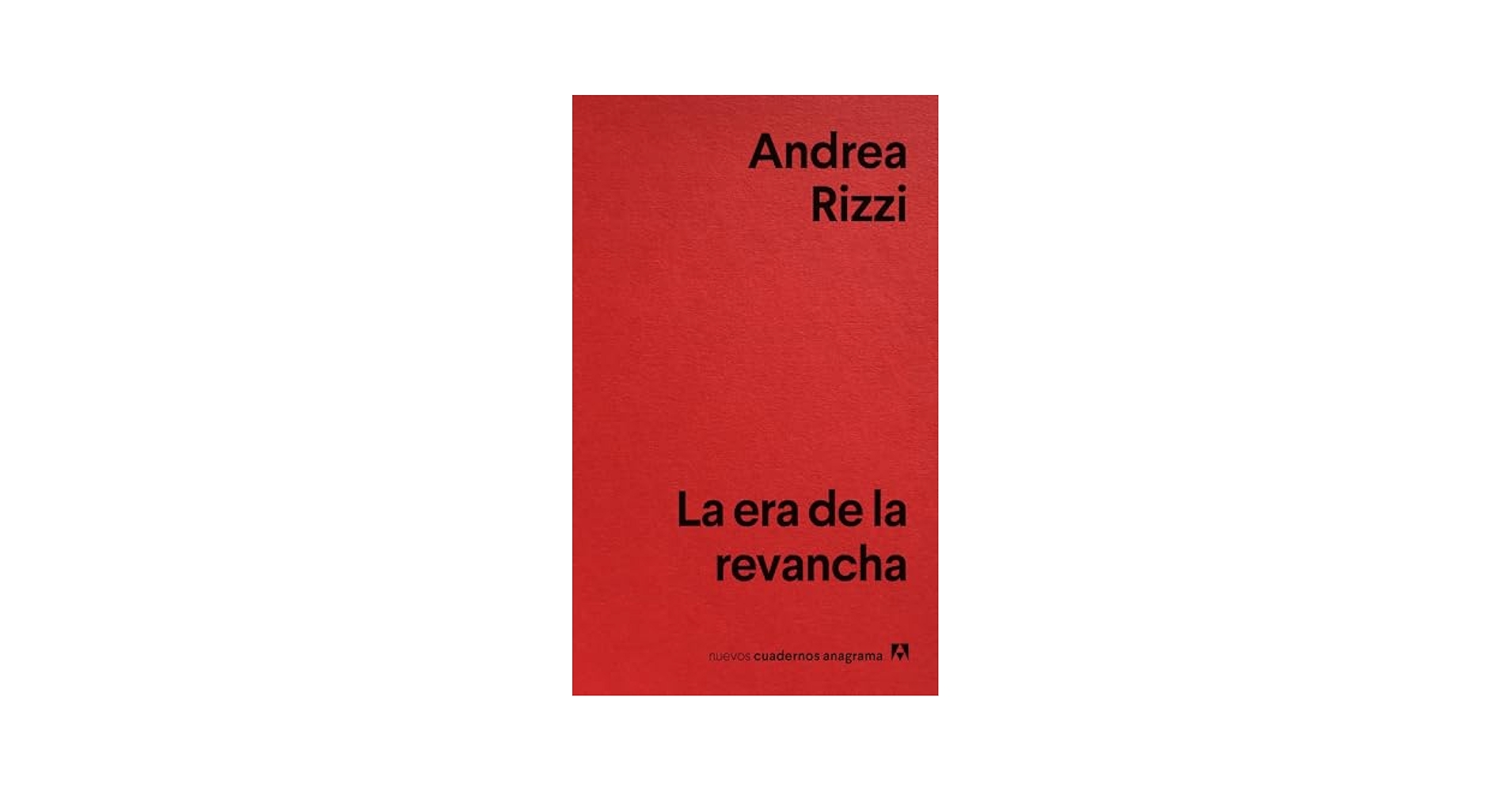'We live in an age of unleashed power and brute force': Andrea Rizzi

We live in an era marked by brutality, a new world order where two opposing blocs are marked by a common drive: redress. In his essay The Age of Revenge (Anagrama), Andrea Rizzi (Rome, 1975) analyzes these times, rich in demagogues and dictators who foster nationalism and political divisions.
A journalist, Rizzi works as a Global Affairs correspondent for the Spanish newspaper El País, where he publishes an opinion column dedicated to Europe. For the analyst, who will present at the Hay Festival in Segovia in September, the world today presents two blocs. On the one hand, the East, where Russia and China, among other countries, seek to recover and reclaim a "glorious" past of which they feel unjustly deprived; and on the other, the West, with its working classes who feel marginalized while witnessing the growing wealth of the upper classes in ineffective democracies. In both, disinformation and identity-based and emotional politics thrive.
“The age of revenge is the time of great hypnosis, in which authoritarian and populist regimes methodically induce a growing state of somnolence of discernment in the population,” Rizzi argues. in conversation with this newspaper. “Thus, lies and suggestions cover up the facts. And they do so with a capillarity never before seen thanks to technological advances.”
Rizzi's style is not only that of a lucid international analyst, but he builds his arguments with a deep knowledge of literature, which he uses to understand human misery and virtue, as well as to delve into the notions of freedom and power.
One of the rematches your book points out is that of the East: Russia and China seek to impose themselves on Western power. Are these powers so united? It's not a formal alliance. They don't have a treaty that establishes, for example, a mutual defense clause. And there are limits to their relationship, even though they have publicly declared that they have a boundless friendship. But this shouldn't lead us to underestimate the importance of their bond. There is one key episode. A meeting their leaders held in March 2023 in which they made a fundamental joint declaration: that they understand that democracy and human rights are not universal values, but that each nation has the right to combine them according to its own tradition.
This should be a wake-up call for anyone who believes in democracy and human rights. That day, Xi Jinping told Putin: “We are witnessing changes never seen in the last 100 years. And when we stand together, we lead them.”

'The Age of Revenge', a book by Andrea Rizzi, published in January 2025. Photo: Anagrama Publishing House.
The rise of nationalist and populist forces is largely due to a social unrest that has fueled resentment among broad segments of the working classes, and which populists have skillfully exploited. First, by listening to it, then by spurring it on and riding it. The alternative to these forces must fully understand the causes of this unrest. And these are multiple: I believe that some of the excesses of capitalism in recent decades have contributed to this unrest, problems of globalization, of the technological revolution, and a certain degree of ineffectiveness in democracies that has reached near paralysis, in some cases.
A radical challenge to the previous model must be proposed. It is important to preserve social cohesion, because there has been an asymmetry in recent decades, whereby the upper classes have taken advantage of this globalized world in the midst of a technological revolution. And many working classes have been unable to maintain or defend their position and have lost stable manufacturing jobs, becoming precarious. There has been a social divide that has caused resentment. I want to emphasize a fundamental element: attention to education systems. They are key to ensuring that every citizen has a critical spirit and the capacity for discernment to navigate the modern world and understand where there is manipulation of minds or fake news.
It is important to take care of social cohesion, because there has been an asymmetry in recent decades by which the upper classes have been able to take advantage of this globalized world in the midst of a technological revolution.
Yes, the West has favored China's extraordinary economic rise, including it in the World Trade Organization (WTO) system and neglecting some aspects of this new relationship. This has produced some damaging side effects for the industrialized economies of the West. China's entry into the WTO has enabled economic progress probably unparalleled in human history. And this is positive. It has lifted hundreds of millions out of poverty in China and allowed consumers in the rest of the world access to cheap products, thus containing inflation. All of this is good. However, some side effects were neglected, such as forced transfers of intellectual property applied to companies from the rest of the world that wanted to establish themselves in the Chinese market.
Revenge entails hatred. We see it in political discourse. But there's also great polarization among citizens. Were these scenarios created by populism or are they a consequence of it? We live in a time of exacerbated polarization. This phenomenon is reproduced almost everywhere in the world's democracies. I believe that the material problems that have generated unrest are not in themselves the cause of polarization. There is an essential factor in generating polarization, and that is the conscious and deliberate action of certain actors. Giuliano da Empoli calls them the "engineers of chaos": they are the key to understanding polarization and have been able to explore the unrest. But they have then used it to consolidate their political interests.

Rizzi is a global affairs correspondent for the Spanish newspaper El País. Photo: Taken from X @and_rizzi
They are a group of figures with extensive knowledge of the digital domain, with a deep understanding of the dynamics of political marketing, and who have built relationships with populist leaders.
Elon Musk? Yes, of course, and Donald Trump and Steve Bannon. It's Cambridge Analytica and Brexit. It's Gianroberto Casaleggio and the Five Star Movement in Italy, to cite an example that isn't ultranationalist, because the "engineers of chaos" aren't just ultranationalists. They're guilty of a terrible deterioration of the sociopolitical fabric to the point where our societies have almost no bridges. Blowing them up has been very easy; rebuilding them will be very difficult.
Can President Javier Milei place Argentina on the geopolitical map in a position of importance? Today, international rules and institutions are increasingly less respected, and brute force increasingly counts. In this new world, therefore, those who will have geopolitical prominence are the countries that wield brute force. It's that sad. We live in an era of unleashed powers, with, in some cases, imperialist instincts. We just attended a NATO summit in which the European allies, with the exception of Spain, committed to an extraordinary increase in military spending. What counts today is brute force and strategic force, which is technological and innovative strength. In this world, countries like Argentina, but many others as well, like Spain, are left out of geopolitical prominence.
Today, international rules and institutions are less and less respected, and brute force is increasingly important.
It's not easy to be optimistic. But that doesn't mean abandoning ourselves to defeatism. I believe the European Union will continue to exist. There is a strong awareness within it of this change of era. And that this change of era requires a profound adaptation of the common European project, in terms of greater integration, to avoid being overwhelmed in this new world of imperialist tendencies, with powers unleashed in defense of their interests. This has to do both with the strength of national-populist parties within the European project, which obviously hinder that integration, and also with nominally pro-European forces clinging to petty national interests. We have, on the one hand, the nationalist monster and, on the other, the short-sighted national interest.
Spain is immersed in a political crisis, with citizen discontent and corruption scandals. What is the solution to this crisis affecting the government, which is unable to reach consensus on essential laws, such as the budget? Spain faces a dichotomous situation. It has a vibrant economy that creates jobs, and there is a thriving community. However, the political sector is suffering a profound crisis. If the question is how I imagine the way out, there can of course be a reflection on the most immediate elements that could trigger a solution: a vote of confidence, the calling of new elections, the proposal of a vote of no confidence. There are different paths. For the moment, I believe the Spanish government is determined to remain in power, even if its capacity for action is severely limited. Therefore, I think any of these scenarios are unlikely to occur in the short term. But I would like to offer what I believe is a more profound answer regarding the solution. Spain needs to break out of this spiral of poisonous polarization in which it finds itself and into which it is sinking. A spiral governed by a sense of irrational partisanship. The sentiment of "closing ranks" prevails, even above values. There are elements, especially on the right side of the political spectrum, that have fueled this polarization, generating a counter-effect that has also generated polarization on the other side. This makes it impossible to find rational solutions to political problems. Therefore, for me, the true solution, aside from the immediate one, is rebellion.
A rebellion? How? Like the one we are summoned to, from very different quarters, by Albert Camus in The Rebel or Italo Calvino with The Baron in the Trees. The protagonist of this novel, at the age of twelve, rebels against his parents, who are Ancien Régime, representatives of an irrational politics. They want to feed him snails for lunch. He tells them: "No, no, and no." He climbs out the window and into the trees. Well, we must say "no, no, and no" to that politics. And generate one that is not polarized and emotional, but rational. There are elements of the defense of democracy that are now essential. We must overcome emotional polarization to redirect this country toward a healthier and more constructive politics.
In your essay, you argue that social media and artificial intelligence are surveillance tools that have undermined democracy. How so? Social media is spying on us, we know, we're not naive. We can and should have a civic responsibility toward social media. Artificial intelligence is, of course, a multifaceted reality that will bring great benefits to human beings. At the same time, it entails enormous risks, such as socioeconomic ones, in the sense that it can disrupt labor markets, perhaps contributing to fostering inequalities. Social media can play a particularly damaging role because we live in a time of global cognitive warfare, a fight for people's minds. And added to these factors is the enormous disruptive potential of artificial intelligence, which can create content that enhances people's capacity for hypnosis. So we must be aware of them and try to respond.
How could civic responsibility be exercised? This must come from public authorities through regulatory action, for example. The European Union has already taken initiatives in this direction with pioneering regulations on artificial intelligence, as well as regulations on digital services. The role of the media is fundamental, hopefully, in offering healthy narratives that contribute to helping citizens form balanced judgments about things. However, I believe we must not fall into paternalism: citizens also have their own responsibility. The Italian poet Eugenio Montale encouraged us with verses that, in my opinion, are extraordinarily relevant: "Look for a broken mesh in the net / that oppresses us, jump out, flee!"
For the Nation (Argentina) – GDA
eltiempo



%3Aformat(jpg)%3Aquality(99)%3Awatermark(f.elconfidencial.com%2Ffile%2Fbae%2Feea%2Ffde%2Fbaeeeafde1b3229287b0c008f7602058.png%2C0%2C275%2C1)%2Ff.elconfidencial.com%2Foriginal%2F02b%2F16c%2F51d%2F02b16c51d6577db09a115c29c77b1d62.jpg&w=1280&q=100)